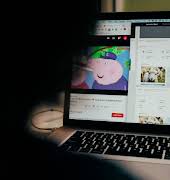
Women Are Deemed Better At Coding Than Men But Only When Gender Is Hidden
By IMAGE
09th Mar 2016
09th Mar 2016
woman wearing checkered shirt in office
In the wake of International Women’s Day, we’re still running around the office singing ‘WHO RUN THE WORLD’ by Beyonce and posting our favourite wonder woman quotes to Instagram. Do join us! In this celebratory mood, nothing could dampen our mood. And then we stumbled upon this study that suggests that women are better at writing code than men. Women score a higher approval rating than code written by men but it comes with a bee-stinging caveat; it only scores higher when their gender is unidentifiable. Boo.
Though yet to be peer reviewed and critically appraised by fellow experts in the field, this US study focused their research on an open source program-sharing service called Github. Analysing nearly 4 million users on the platform, the researchers found that ‘pull requests’ or suggested code changes that are made on the service by female coders were more likely to be approved than those written by men. The developer platform has over 12 million users to date however it does not request gender information from those who sign up.
Those behind the study at North Carolina State University honed in on one particular day of activity, April 1st of 2015, when 4 million people logged on. By looking at email addresses or matching up names with Google+, they were able to determine whether 1.4 million users were male or female. Interestingly, the researchers found that 78.6% of pull requests made by women were accepted compared with 74.6% of those by men. It’s not a huge difference, but it certainly demonstrates that women are highly skilled in this field, though figures of those currently working in the STEM industries would suggest otherwise. (As per 2015 reports, just 16% of Facebook’s tech staff and 18% of Google’s tech staff were women.)
According to the BBC, the researchers considered various factors, such as whether women were more likely to be responding to known issues, whether their contributions were shorter in length and so easier to appraise, and which programming language they were using, but they could not find a correlation. Great news.
But here’s where it all goes rather downhill. When analysing the approval rating of those in the Github community whose profiles were clearly marked as belonging to a female coder, their acceptance rating was much lower than those whose gender was kept under wraps.
“For outsiders, we see evidence for gender bias: women’s acceptance rates are 71.8% when they use gender neutral profiles, but drop to 62.5% when their gender is identifiable . There is a similar drop for men, but the effect is not as strong.vWomen have a higher acceptance rate of pull requests overall, but when they’re outsiders and their gender is identifiable, they have a lower acceptance rate than men. Our results suggest that although women on Github may be more competent overall, bias against them exists nonetheless,” the researchers concluded.
Talking to the BBC about their findings, Dr Sue Black OBE explains what benefits can come of such research:
“I think we are going to see a resurgence of interest from women in not only coding but all sorts of tech-related careers over the next few years. Knowing that women are great at coding gives strength to the case that it’s better for everyone to have more women working in tech. It was a woman – Ada Lovelace – who came up with the idea of software in the first place, we owe it to her to make sure that we encourage and support women into the software industry.”
Hear hear.























